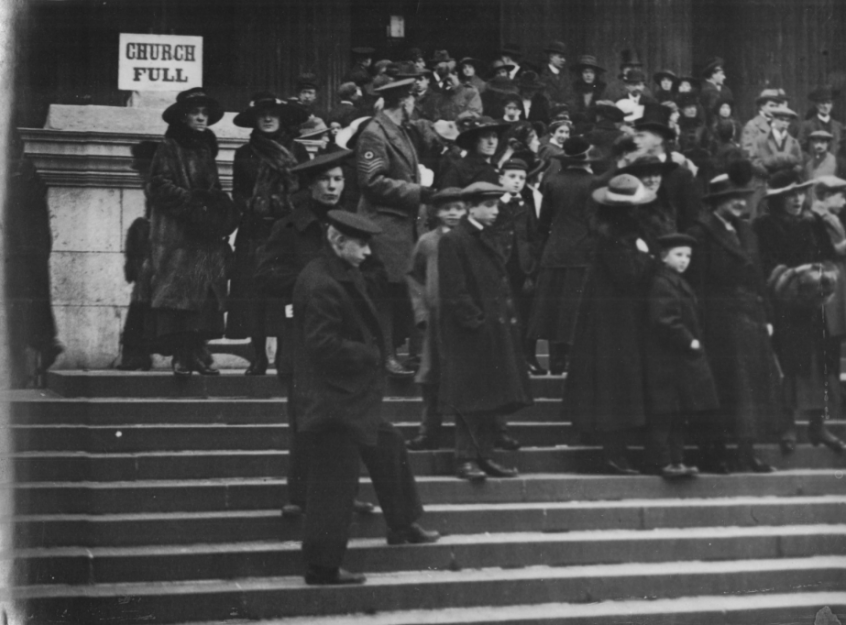One of the most difficult challenges for contemporary British Christians as we approach Remembrance Sunday is to understand why the Christians of a century ago were in general so hugely supportive of Britain's engagement in the Great War.
Charles Gore, Bishop of Oxford, told his clergy: 'I may take it for granted, I dare say, that we are all of one mind in believing that it was our duty to engage in this war.' The President of the Primitive Methodist Conference, a denomination far removed from the established Church of England, wrote: 'The call of our beloved nation to all of us to render service in any and every conceivable way will meet with a ready and immediate response on the part of us all.'

The contrast with the responses of the British Churches to more recent conflicts is self-evident. We may recall the attitudes of church leaders to the first Iraq war, or to the sending of the task force to the Falklands. In 1918 there was no argument between Church and State comparable to the confrontation between Archbishop Robert Runcie and Prime Minister Margaret Thatcher over the tone and content of the Thanksgiving Service after the liberation of the Falkland Islands. Almost all the main denominations in 1914 fully supported the government. The big question, from the perspective of 2018, is 'Why?'
While just days before the declaration of war, many in the churches had been urging that Britain should avoid getting involved in the crisis which was brewing across the Channel, the invasion of Belgium by Germany totally undermined that argument. Germany's military action was brutal, and while some stories may have been exaggerated by the press at the time, it is indisputable that civilians who offered any resistance whatsoever were attacked, killed and raped, their houses razed to the ground, on a massive scale. Very soon, press reports enraged the people of Britain, and within a few days, boat loads of refugees were being warmly welcomed in British towns.
Britain, it was argued, had a moral duty to defend smaller countries, and to ensure that the might of the German army did not trample over what was right. Whatever the technicalities of the various international treaties, the pillage and rape of 'brave little Belgium' triggered a gut response of outrage and horror in the people of Britain, which motivated a grass-roots response.
In 1914, while the halcyon days of the British Empire were past, Britain still saw herself as the guardian of civilisation for the world. Moreover, for many in the churches, it could not be that it was purely by chance that a quarter of the land on classroom globes was pink. Indeed, it must have been divinely-intentioned that the Empire had become so large and so powerful. Therefore, it was believed, Britain and her Empire had a God-given duty to respond when the militarism of Germany threatened Europe. The conflict was not between two countries with conflicting geo-political interests, but between good and evil. On August 2, 1914, the Archbishop of Canterbury had declared, 'The thing which is now astir in Europe is not the work of God but the work of the devil.'
Consequently while some British Christians did become conscientious objectors, the vast majority supported the war and well over a million practising Christians enlisted. For many it was a matter of Christian duty – a matter of conscience.
From our perspective, it is all too easy to dismiss their response as naïve and misguided, if not plain morally wrong. Yet I suspect that most of us, in their shoes, would have done the same. The 'mud and futility' narrative of the Great War, so dominant in popular culture, has warped our perceptions of the conflict. It is arguable that the First World War, responding to the invasion of Belgium, was just as morally justified as was the Second, triggered by the invasion of Poland. The Kaiser may have been less of a danger than Hitler, but in 1914, no such comparisons were possible. Nor should we let what happened in 1914-18, a military stalemate along the Western Front caused by the state of military technology at that particular time, affect our judgment of the decision to respond to the invasion of Belgium.
Of course, war is contrary to God's will for humanity. Of course, we should pray and strive that wars may cease. Those who are pacifists will reject the validity of every declaration of war, and I respect their opinion. For those of us who do not – and it is the rise of Hitler which stops me from being a pacifist – we cannot honestly claim to remember and respect the Christians of a century ago if we do not try seriously to understand why they believed that it was right for Britain to go to war in 1914.
Stuart Bell is a Methodist minister, and an honorary research fellow of St John's College, Durham. In his book 'Faith in Conflict', published in 2017 by Helion & Co, he examines how the Great War affected the faith of the people of Britain.













